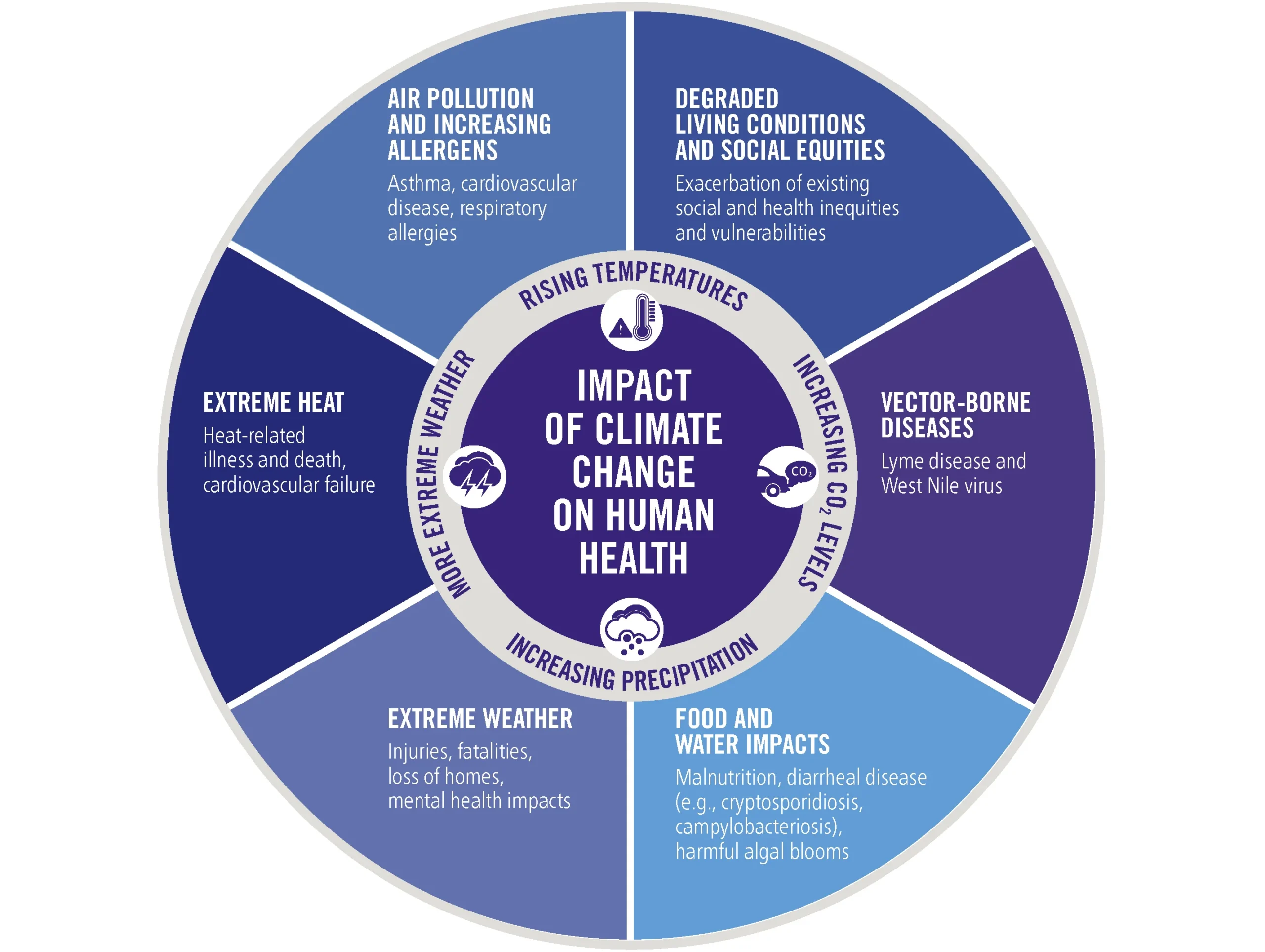Climate Change & Health Impacts:
Climate change is posing a significant threat to human health around the world. This is happening in several ways. More extreme weather events like heatwaves, floods, and droughts can cause injuries, illnesses, and even death. Rising temperatures can worsen air quality, leading to respiratory problems and heart disease. Changes in precipitation patterns can impact water quality and increase the spread of waterborne diseases. Climate change can also disrupt food production, potentially leading to malnutrition. The effects of climate change are felt most acutely by vulnerable populations, such as children, the elderly, and those living in poverty. Taking action to mitigate climate change and adapt to its effects is crucial to protecting human health for generations to come.
Climate change is an issue that affects every corner of the globe, with far-reaching implications for human health. From rising temperatures to extreme weather events, the impact of climate change on health is profound and multifaceted. In this article, we delve into the various ways in which climate change intersects with public health, exploring its effects on infectious diseases, mental health, nutrition, and vulnerable populations.
Table of Contents
Understanding the Link Between Climate Change and Health
The Rising Threat of Infectious Diseases
Climate change creates favorable conditions for the spread of infectious diseases such as malaria, dengue fever, and Zika virus. Warmer temperatures allow disease vectors like mosquitoes to thrive in new regions, increasing the risk of transmission to human populations. Additionally, extreme weather events such as hurricanes and floods can disrupt sanitation systems, leading to waterborne diseases like cholera.
Mental Health Challenges in a Changing Climate
The psychological toll of climate change cannot be overstated. Natural disasters and environmental degradation contribute to stress, anxiety, and depression among affected populations. Displacement due to climate-related events also exacerbates mental health issues, as individuals grapple with loss of homes, livelihoods, and community ties.
Impacts on Nutrition and Food Security
Changes in climate patterns disrupt agricultural systems, affecting crop yields and food availability. This, in turn, can lead to malnutrition and food insecurity, particularly in low-income communities reliant on subsistence farming. Additionally, extreme weather events such as droughts and floods pose challenges to food production, further exacerbating the problem.
Vulnerable Populations at Risk
Children and the Elderly
Children and the elderly are particularly vulnerable to the health impacts of climate change. Young children are more susceptible to diseases and malnutrition, while the elderly may struggle to cope with extreme heat events. Moreover, limited access to healthcare services exacerbates these vulnerabilities, placing these demographics.Climate Change & Health Impacts
Low-Income Communities: Climate Change & Health Impacts
Low-income communities bear a disproportionate burden of the health impacts of climate change. These communities often lack adequate infrastructure and resources to mitigate the effects of extreme weather events and environmental degradation. Additionally, systemic inequalities contribute to disparities in access to healthcare, further exacerbating health inequities.
Conclusion: Climate Change & Health Impacts
In conclusion, climate change poses significant challenges to global health, with far-reaching implications for infectious diseases, mental health, nutrition, and vulnerable populations. Addressing these challenges requires concerted efforts at the local, national, and international levels, including mitigation strategies to reduce greenhouse gas emissions and adaptation measures to protect communities from the impacts of climate change.
FAQs: Climate Change & Health Impacts
1. How does climate change affect infectious diseases?
Climate change creates favorable conditions for the spread of infectious diseases by altering temperature and precipitation patterns, allowing disease vectors to thrive in new regions.
2. What are the mental health impacts of climate change?
Climate change can contribute to stress, anxiety, and depression among affected populations, particularly in the wake of natural disasters and environmental degradation.
3. How does climate change impact food security?
Changes in climate patterns disrupt agricultural systems, affecting crop yields and food availability, which can lead to malnutrition and food insecurity, especially in low-income communities.
4. Why are children and the elderly particularly vulnerable to climate change?
Children and the elderly are more susceptible to the health impacts of climate change due to factors such as their developing immune systems and reduced ability to regulate body temperature.
5. What can be done to address the health impacts of climate change?
Addressing the health impacts of climate change requires comprehensive strategies, including mitigation efforts to reduce greenhouse gas emissions and adaptation measures to protect vulnerable populations.







